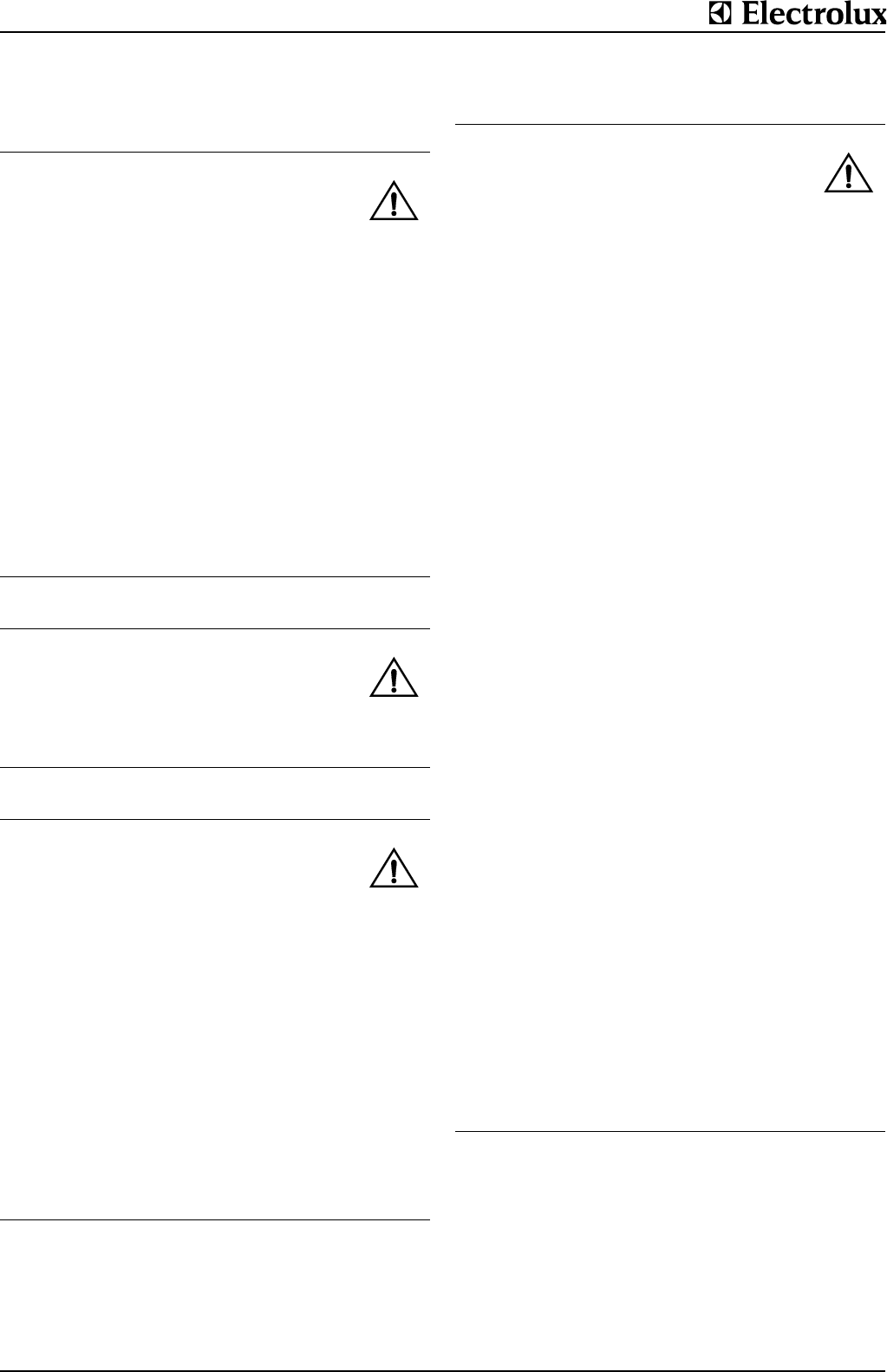
GENERAL INFORMATION
62.9695.01 Page 3
I . GENERAL INFORMATION
1. INSTRUCTIONS FOR SAFETY AND USE
1.1 INSTALLATION AND INITIAL OPERATION
1.2 OWNER'S OBLIGATIONS
1.3 USE AS PRESCRIBED
1.4 SAFETY-CONSCIOUS WORKING
S The installation, adjustment and initial opera-
tion of the appliance must be carried out
according to the manufacturer's instructions
and only by an authorised specialist.
S Installations for the supply of electricity and
gas must be carried out by approved special-
ists in compliance with specific national and
local regulations. They bear the responsibility.
S The installation must conform with local
codes, or in the absence of local codes, with
the National Fuel Gas Code, ANSI
Z223.1/NFPA 54, or the Natural Gas and
Propane Installation Code, CSA B1 49.1.
S The appliance and its individual shutoff valve
must be disconnected from the gas supply
piping system during any pressure testing of
that system at pressures in excess of 1/2 psi
(3.5 kPA)
S The appliance must not be placed in opera-
tion until the user has become familiar with its
operation. The operating instructions and the
related safety precautions must be followed
precisely. Follow strictly the attention and
warning label indications on the appliances.
S The manager is responsible for ensuring that
all components relevant for safety are in per-
fect working order at all times. The operating
condition of these components must be exam-
ined by an authorized technician at least once
a year and any defects remedied if required.
S Retain the manual for future reference.
S The appliance must only be used for cooking
food in commercial kitchens. The appliance
has only been approved for supervised oper-
ation by trained persons.
S Closed containers (jars, cans, bottles, tubes,
etc.) must not be heated owing to the danger
of bursting and injuries.
S The appliance must not be filled above the
level mark 4 cm below the boiler rim.
Depending on the type of food to be cooked,
filling must be less so as to prevent bubbling
over.
S This appliance must not be used for deep fat
frying purposes. Do not use large cuantities
of oil. The appliance must not be operated
close to materials and vapours which consti-
tute a fire hazard.
S During operation, no objects are to be placed
on the lid
S Overheated oil can self-ignite. Never quench
burning oil with water, but smother the flames
with the cover or a wet cloth.
S Spraying the appliance or parts of it with a
high-pressure cleaning device may cause
malfunctions and is not to be done.
S The escape of burnable gases represents a
fire and explosion hazard. Action in the case
of a gas leak and a smell of gas:
- No smoking, no fire
- Do not operate electric switches or bells.
- Close gas cylinder valves and the main
gas valve on the appliance.
- Ventilate the room thoroughly
- Place the leaking gas cylinders upright in
the open with valves closed.
S The waste-gas outlets of the roasting and
baking oven become hot. Avoid touching
them.
S The waste-gas outlets of the roasting and
baking oven are not to be covered by any
objects.
S Keep the appliance area free and clear from
combustibles
S Do not obstruct the flow of combustion and
ventilation air.
S To avoid damage to the appliance, do not let
water flow from the mixer tap onto the cook-
ing plates.
S When putting oil, fat, water or ingredients in
the preheated hot boiler, they may splash -
danger of burning!
S Always use the handle to open the cover.
Note that while doing so, hot air or steam
may flow out or hot fat may spit out - danger
of burning!
S Keep your distance from the lid closing area
when closing the lid - danger of injury!
S To avoid damage to the appliance the mixer
tap outlet must be to the front before the lid is
opened or closed.
S Tilting is only to be carried out slowly to avoid
the contents spilling over the rim.
S Hot steam can be expelled on opening the
lid. Staff must take appropriate measures
(stand well back) to avoid injuries.
S The area around the tilting boiling pan must
be kept free. Tilting is only to take place with
the lid fully open. - danger of burning!
S Devices on wheels set up in block configura-
tion must be checked before each start-up
whether the potential equalization is con-
nected with the neighbour equipment. The
connection may be done only by authorized
technical personnel.
S Appliances on wheels must be fastened with
the wall.













